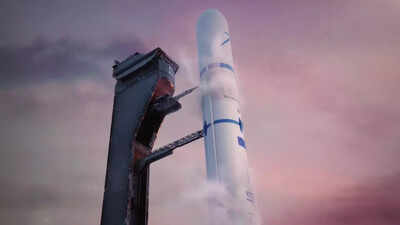- News
- Science News
- German startup Isar Aerospace cancels test flight of its 95 feet Spectrum rocket amid weather issues
German startup Isar Aerospace cancels test flight of its 95 feet Spectrum rocket amid weather issues
Isar Aerospace aims to revolutionize space launches with its Spectrum rocket, which uses liquid oxygen and propane for an eco-friendly, high-performance solution. Despite a delayed first test flight, the company remains optimistic. With plans to manufacture 40 rockets annually, Isar seeks to provide reliable satellite launch services from Europe, marking a new chapter in space exploration.
Isar Aerospace is a pioneering company that aims to revolutionise the space launch industry. Its Spectrum rocket, powered by liquid oxygen and propane offers a low-environmental impact, performance-efficient solution. Targeting affordable, safe, and efficient access to space, Isar Aerospace aims to meet the growing demand for satellite launches. Although the first test flight was postponed, the firm is optimistic about the future. Isar Aerospace is pushing space technology ahead and positioning Europe as a prominent player in space exploration, opening up new possibilities for industries worldwide.
German startup Isar Aerospace cancels test flight Spectrum rocket
Isar Aerospace 95ft Spectrum rocket was initially planned to take off from Norway's Andoya Space Centre, but because of weather, the flight was delayed. While this is disappointing news, the company is optimistic, planning for a delayed launch window. Isar Aerospace's focus on acquiring data and system calibration on this first test flight is a giant step towards future success, even though there was no paying customer's payload.
Historic significance of Isar Aerospace's mission
European countries in the past have done rocket launching only outside the continent of Europe, i.e., France's Diamant 1965 rocket launched from Algeria and UK Black Arrow launched from South Australia in 1971. The European Space Agency (ESA) did rocket launches from French Guiana in South America for an extremely long time but no direct rocket launches from the surface level in Europe.
Isar Aerospace is looking to break this by having a realistic and efficient solution to putting satellites in space from Europe. The first test flight cannot be an orbital success in itself, but it is a very big step forward in developing the technology needed to put payloads into orbit.
Isar Aerospace mission vision
The final goal of the company is to manufacture as many as 40 rockets annually, which will make it easy for various industries to reach space. Isar Aerospace's "enabling human development" mission via sustainable technological and economic growth is the larger value proposition of space exploration in solving the issues of the world. Apart from its contribution to the study of space, the venture may begin the development of satellite technology that will impact businesses across the globe.
Despite the initial failure to launch, Isar Aerospace believes that it can be successful with its launch into orbit in the not-so-distant future. While the company progresses further in rocket technology development, it can be a top industry player in the space market before long, providing routine and reliable launches for the deployment of satellites from European grounds.
With the creativity and desire for development at Isar Aerospace, Europe will soon be part of the club of space nations that can carry out rocket launches from its own ground, opening a new chapter of space exploration.
Also Read | Frog species once thought lost for 130 years rediscovered in Chile’s untouched ecosystems
End of Article
FOLLOW US ON SOCIAL MEDIA


